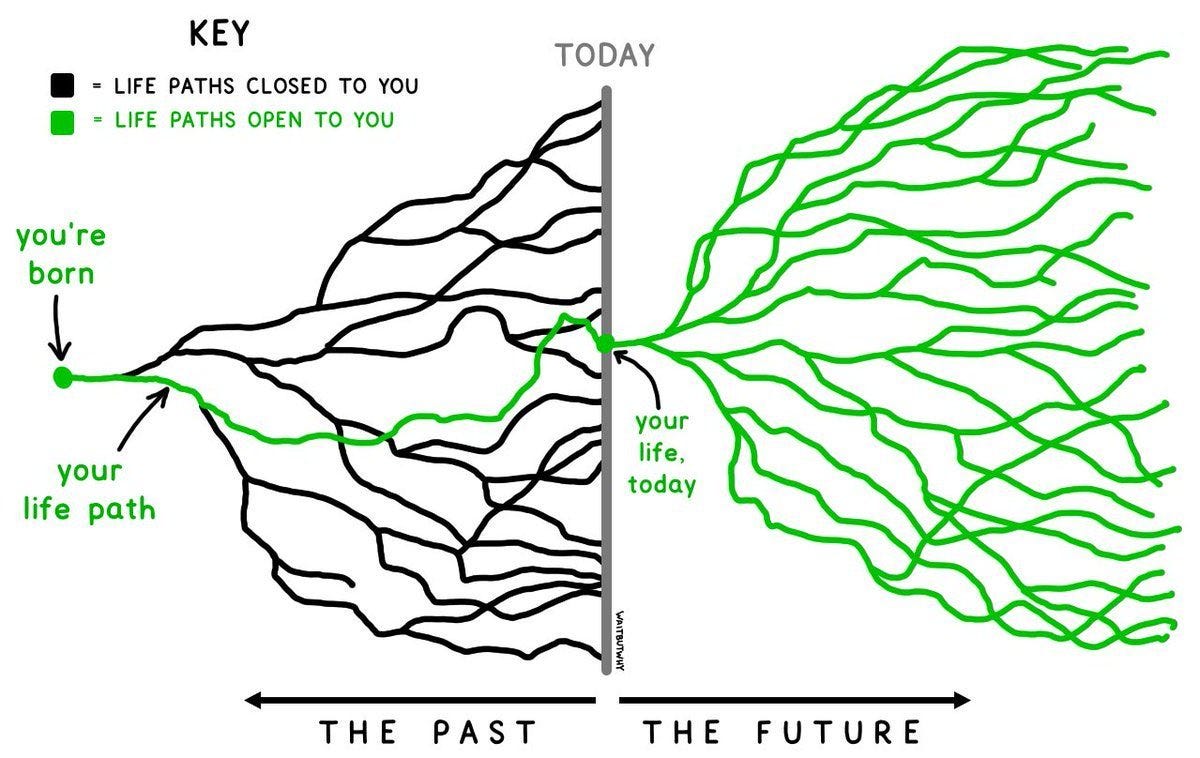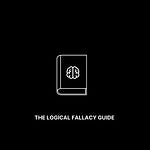Welcome to the 1,441 new members of the curiosity tribe who have joined us since Friday. Join the 64,851 others who are receiving high-signal, curiosity-inducing content every single week.
Today’s newsletter is brought to you by Athletic Greens!
On last week’s episode of the Where It Happens podcast, we interviewed new Athletic Greens President & COO Kat Cole. Athletic Greens is the one product I use every single day. I have been taking their halo product—AG1—first thing when I wake up for the last 5+ years. It’s my personal nutritional insurance policy.
Special Offer: Athletic Greens is offering a free 1-year supply of Vitamin D (for those dark winter months) and 5 travel packs with all new orders to Curiosity Chronicle subscribers. Use the link below to take advantage of this offer!
Today at a Glance:
In the normal course of my content consumption habits, I come across a steady stream of learnings, ideas, and connections, some of which have an asymmetrical impact on my life.
In this post, I share a list of 20+ high-impact ideas on business, investing, growth, and life, all of which were learned or surfaced in the last year.
I plan to begin sharing a regular quarterly post of new ideas to bring you along for this learning journey.
The Most Powerful Ideas
I am an avid content consumer.
Content consumption is a core part of my “job”—a critical element of my personal flywheel. I have built a “content engine” (more on that in a future post!) that provides a steady stream of learnings, ideas, and connections, all of which amplify the quality of my investing, business building, and content creation pursuits.
In this post, I’d like to share some of the most powerful ideas I have come across over the last year, with additional notes and insights where helpful.
So let’s dive right in: 20+ high-impact ideas on business, investing, growth, and life…
Time Billionaire
Time is our most precious asset.
When you're young, you are a "time billionaire”—rich with time. Too many people fail to realize the value of this asset until it is gone.
Treat time as your ultimate currency—it’s all you have and you can never get it back.
Sahil Note: When I first learned this concept—from a Tim Ferriss podcast with Graham Duncan—it hit me hard. I had spent most of my life prioritizing the value of money or power, when the reality is that time is our most valuable asset, and the only one that cannot be bought or sold. It forced me to think deeply about how I want to spend my time, who I want to spend it with, and why I want to pursue certain paths over others. I would encourage you to think deeply about the same…
Darkest Hour Friends
It's easy to be there for people to celebrate their wins. It takes character to show up for them in their darkest hour.
People never forget those who supported them when the chips were down.
I call these your “darkest hour friends”—find them, treasure them.
Engineered Serendipity
Some of what we call "luck" is actually the macro result of thousands of micro actions. Your daily habits can put you in a position where "luck" is more likely to strike.
It's possible to increase your serendipity surface area and engineer your own luck.
Sahil Note: Serendipity surface area is an interesting concept. When you’re on a “track” in your life or career, you are walking on such a narrow path that very little luck can hit you. The more you open yourself up to the world—to new experiences and people—the more you expand your serendipity surface area. There’s quite literally more area for luck to strike.
Leverage
"Give me a place to stand and a lever long enough and I shall move the world." - Archimedes
Leverage is anything that multiplies the force of your inputs.
Building systems that provide leverage on your time, money, and energy will allow you to create a life you deserve.
Sahil Note: Leverage can cut both ways. When used too aggressively, it can be a negative (just ask Archegos or the founders at Long-Term Capital Management). Beware of over-leveraging your life or pursuits!
Free Time as a Call Option
You've incorrectly been told that free time is bad—hustle culture lied to you.
The reality: Free time is a call option on future interesting opportunities.
When you have free time, you have the headspace and bandwidth to pursue high-upside ideas.
Sahil Note: I have learned that the same idea applies to cash. I used to believe that I had to be fully invested, otherwise I was leaving return/yield on the table. But I later realized that cash is a call option on future interesting opportunities. Having some idle cash allows you to invest in that new idea, pursue a weekend project, etc. It’s worth it.
Decentralized Friend Groups
There are two types of friend groups:
Centralized: one cluster of friends with shared backgrounds & beliefs.
Decentralized: small, varied, unconnected clusters of friends.
When in doubt, opt for decentralized friend groups. The variety of backgrounds and beliefs is the key to developing independent thought.
Sahil Note: I picked this up from my friend George Mack, who I would consider part of one of my decentralized friend groups. The internet affords ample opportunity to build these groups. Join a few Discord servers, share ideas, build a micro-community. There has never been a better time in history to do it.
Work Like a Lion
9-5 work culture is a remnant of the Industrial Age—it emphasizes long periods of steady, monotonous work.
Most people are not wired to work 9-5. Parkinson’s Law states that work expands to fill the time available for its completion. When you establish fixed hours to do your work, you find unproductive ways to fill it—you work longer, but get less done.
In the Digital Age, those who do creative work will stand out and be rewarded. If your goal is to do this inspired, creative work, you have to work like a lion.
Wait. SPRINT. Eat. Rest. Repeat.
Q1 Relationships
All relationships exist on a 2x2 matrix of:
How healthy it is
How enjoyable it is
Q1 relationships are healthy & enjoyable. Focus on spending more energy on your Q1 relationships—cherish them.
Scrub the Q4s from your life.
Sahil Note: I learned this from my friend Tim Urban, who is one of the deepest thinkers I know. If you aren’t already following him, you should do that ASAP…
The Persuasion Paradox
Have you noticed that the most argumentative people rarely persuade anyone of anything?
The most persuasive people don’t argue—they observe, listen, and ask questions. Argue less, persuade more.
Persuasion is an art that requires a paintbrush, not a sledgehammer.
Inversion
“All I want to know is where I’m going to die, so I’ll never go there." - Charlie Munger
The best innovators think forward AND backward.
When faced with a challenging problem, reframe it in inverse form—new perspective allows you to solve the problem more creatively.
Sahil Note: Inversion is one of my favorite mental models. You can use it for generating new business ideas, solving complex problems, or managing and maintaining healthy personal and professional relationships. The use cases are literally endless.
Green Lines vs. Black Lines
Consider this image from Tim Urban:
Black Lines = paths closed
Green Lines = paths open
Stop focusing on the black lines behind you. Start focusing on all of the green lines before you.
It is a future with immense opportunity.
Ben Franklin's "Junto"
In 1727, Benjamin Franklin organized a weekly meeting with a small group—they called it The Junto Club.
It was a collection of minds from diverse industries. They gathered weekly to discuss, collaborate, and brainstorm on topics ranging from business to politics to relationships.
The key insight: Learning is communal, not individual. Find your Junto.
Build vs. Sell
To be successful, you either need to learn how to build or you need to learn how to sell.
If you aren't technically-gifted, that's ok—just learn to sell. If you can sell, you'll always make it.
People who know how to build AND sell are unbeatable.
Sahil Note: I first learned this from Naval Ravikant and have thought about it ever since. It’s a powerful razor for thinking about where you can excel and win. I’m not technical—I don’t know how to code—so it convinced me that “selling” would be my path. For what it’s worth, most Fortune 500 CEOs are probably in the sell camp…
The Feynman Technique
The Feynman Technique is a powerful framework for learning anything.
The best entrepreneurs, investors, and thinkers have leveraged this technique—whether they know it or not! Their common genius: the ability to abstract complexity and convey ideas in simple, digestible ways.
Four steps to learn anything new:
Identify a topic: Identify the topic and everything you know about it.
ELI5 (Explain It To Me Like I'm 5): Try to distill the learnings into a simple, elegant “elevator pitch” on the topic.
Study to fill in the gaps in your knowledge.
Organize, Convey & Review: Organize your new knowledge into a tight, compelling narrative. Marvel at your new depth of understanding!
True genius is the ability to simplify, not complicate. Simple is beautiful.
The Weekend Test
"What the smartest people do on the weekend is what everyone else will do during the week in ten years." - Chris Dixon
Observe the weekend projects of the smartest people in your circles. Odds are those will become a key part of our future.
Invest your time, money, and energy accordingly.
Sahil Note: This is one I think about a lot as it relates to Web3, NFTs, and crypto. I had smart friends who were leaving their safe jobs to go build in this new arena over the last few years, but I largely ignored it. They were passionate about the technology and enjoying it on the weekends, but I continued to ignore it. Shame on me, but that won’t happen again…
The Eisenhower Decision Matrix
Learn the difference between urgent and important.
Place all of your tasks on a 2x2 matrix:
Important & Urgent
Important & Not Urgent
Not Important & Urgent
Not Important & Not Urgent
Prioritize, delegate, or delete accordingly.
The Regret Minimization Framework
The goal is to minimize the number of regrets in life.
When faced with a difficult decision:
Project yourself into the future.
Look back on the decision at hand.
Ask yourself "Will I regret not doing this?"
Act accordingly.
This framework was espoused by Jeff Bezos as the driving force behind his decision to leave a lucrative, successful career at a famed hedge fund to start an online bookstore in the late 1990s…
Simple, yet effective.
Sahil Note: The biggest complaint with this framework is that it is rife with survivorship bias. It’s easy for Jeff Bezos to say that he used this framework to make the decision now that he is a trillionaire. My advice would be to use it with care. You don’t want to regret not taking a shot at something you are deeply passionate about. If you feel the intense pull, trust it.
Play to Learn
Two ways to play the game:
Old Way: Learn to Play
New Way: Play to Learn
We are living in an unprecedented era—technology is shattering boundaries, enabling anyone to participate.
If you're trying to learn anything new, put some skin in the game and dive in. It's the best way to learn.
Sahil Note: This concept is closely related to something I have referred to as The Money Paradox. Sometimes you have to lose money in order to make money. Every successful investor and builder has stories of the invaluable lessons learned from a terrible loss in their career. Sometimes you have to pay to learn. Scared money don't make money!
Positive Sum Magnetism
Want to get ahead in life? Start genuinely rooting for others to succeed.
If you adopt that mentality, you’ll become a magnet for the highest quality people.
When you're surrounded by the highest quality people, good things start to happen…
The Wisdom Paradox
“The more I learn, the more I realize how much I don't know.” - Albert Einstein
The more you learn, the more you are exposed to the immense unknown. This should be empowering, not frightening.
Embrace your own ignorance. Embrace lifelong learning.
The Power of No
Take on less, accomplish more.
Success doesn’t come from taking on everything that comes your way. It comes from focus—deep focus on the tasks that really matter.
Say yes to what matters, say no to what doesn’t. Protect your time as a gift to be cherished.
The Zone of Genius
Your Zone of Genius is where your interests, passions and skills align.
Find yours, then slowly shift your life to spend more time in it.
It means playing games you are uniquely well-suited to win—you can stop playing *their* games and start playing *yours*.
There you have it: 20+ of the most powerful ideas in life.
I promise I will continue to compile and synthesize new ideas I come across over the year ahead—I might even make this a regular quarterly post to have you all learn alongside me!
If you enjoyed this, consider sharing it with your network so I can continue to grow this amazing curiosity tribe. Thank you for joining me on the journey!
Where It Happens Podcast
Memes Rule the World with Dogecoin Creator Billy Markus
Watch it on YouTube and listen to it on Apple Podcasts or Spotify. Want more? Join the 4,000+ in our unique community on Discord.
Also, if you haven’t heard the news, I recently became a Meat Influencer via the new ButcherBox sponsorship of the show. You can score 7+ lbs of free meat by using the button below. Get your steak game on!
Special thanks to our sponsors for providing us with the support to bring this episode to life.
Why settle for the old model of investing when new options offer you so much transparency to help you grow your wealth? Commonstock is the home of smart money and an innovative social media approach to investing. We both love the platform and have used it to enhance our financial strategy.
Commonstock is a social media platform like Reddit, but it removes anonymity and adds transparency. The app lets you see what smart money investors are buying and selling – in real-time – all while letting you see their reason why. This way, you know whether investors have skin in the game, or whether they only talk a big game. It’s a great way to get insights that support your investing strategy.
To learn more and sign-up today go to commonstock.com.
Today’s show is sponsored by Capchase. Capchase is a new financing option for fast-growing startups. They are offering Where It Happens listeners .25% off their first draw, preferred onboarding, and more. Their main product Capchase Grow lets you tap into your future revenue today, meaning you can reinvest in your business faster. We love what they are offering to business owners. To learn more go to capchase.com/room!
Sahil’s Job Board - Featured Opportunities
Seven Seven Six - Finance & Compliance Manager
Elevate Labs - Head of Social Media
Pallet - Special Projects Intern
The full board with 30+ other roles can be found here!









































Share this post